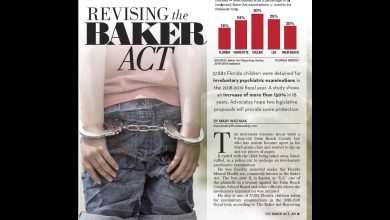
BAKER ACT ATTORNEY FLORIDA AND THE REASONS YOU NEED TO STOP STRESSING ABOUT
Background
Suppose a patient exhibits specific violent or suicidal symptoms of mental illness. In that case, the Baker Act Attorney recommends physicians, mental health professionals, courts, and law enforcement commit the patient for up to 72 hours to a mental health treatment facility. The Baker Act Attorney Florida is there to defuse a crisis and give time for a mental health examination. After the holding period, the person will be free to go if it is okay that they are not at any risk to themselves or others and have a mental health crisis.
The law bears Maxine Baker’s name, a former Florida representative. Notably, as a part of the Florida Mental Health Act at the beginning of the 1970s, by freeing those who posed no threat to themselves or others, this measure restored rights to several people with mental health concerns. However, how does the Baker Act Attorney’s procedure work? You will find the remedy in the blog below.
What comprises the act?
When someone comes under the Baker Act Attorney, they must come under a mental health facility. A mental health facility likewise accepts the Baker Act. The person must have a psychiatric evaluation at the receiving facility within 72 hours.
The person will bring to a mental health institution if they declared dangerous by two separate mental health doctors, either voluntarily or under involuntary inpatient placement. Less frequently, those with mental illness who do not require round-the-clock care may seek outpatient mental health therapy.
The individual will be okay to go after 72 hours if no mental health problems catch. They will be also okay to go if they are discovered but are not harmful.
Standards of Baker Act Attorney Florida
Any person who wants to be temporarily committed to a psychiatric institution must fulfill the following requirements:
- The individual has a mental illness or is mentally ill.
- The person refuses a voluntary mental health examination or fails to understand.
- The individual is a risk to himself or others, or they cannot take care of themselves.
- A voluntary Baker Act is also an option, but the person must be able and willing to consent to treatment.
How to identify mental health under the Baker Act Attorney?
Generally speaking, the following actions are signs of a mental emergency:
First, to hear voices or to see things that aren’t on reasonable grounds for Baker act an individual. The hallucination involves harming oneself or others also come under the Baker Act.
Suicidal thoughts: The Baker Act Attorney may invoke this if a person expresses suicidal thoughts or threats. It is particularly valid if the individual in question has easy access to weapons or a history of self-harm.
Unable to take care of oneself: When someone refuses to meet their fundamental requirements. The requirements include sleeping, eating, keeping themselves clean, taking their prescriptions, or maintaining their living area, it may be time for a mental health examination.
Treatment may be required if mood disorders, such as depression, make a person feel hopeless. Treatment is also necessary when it comes to make it tough for them to continue about their everyday lives.
Substance abuse: A Marchman Act would be more suitable for extreme substance misuse.
Difference between Marchman Act and Backer Act
Although similar, the Marchman Act and the Baker Act apply in distinct situations. The Marchman Act and Baker Act are different in that they deal with those who are unable due to substance misuse as opposed to mental disease. The Marchman Act applies under the same circumstances if the person cannot care for themselves or is a threat to himself or others, is detach from reality, etc.
Co-occurring illnesses, also known as comorbidity, arise when a person exhibits symptoms of mental disease and drug use. One disorder frequently precedes another in co-occurring conditions. In these circumstances, illnesses are necessary to treat concurrently in dual diagnosis therapy.
Summary
In Florida, the court, law enforcement, medical practitioners, and mental health specialists are among the groups that can enforce the Baker Act. So if you’re worried about a friend or family member’s safety, you have a few alternatives and believe a Baker Act Attorney is necessary to assess their mental health.
First, calling the police will have that individual’s Baker act immediately if they are actively displaying symptoms of severe mental illness, threatening to harm themselves or others, or seeming divorced from reality.
Alternatively, you might submit a petition asking the court to order mental health evaluation of the subject. A formal declaration outlining the specifics of the mental condition and the justifications for a Baker Act Attorney would be necessary for this situation.
To ensure that the transition into treatment is as easy as possible, it is beneficial for all parties if the individual submitting the petition takes the time to select the finest mental health institution and Baker Act-receiving facility.




